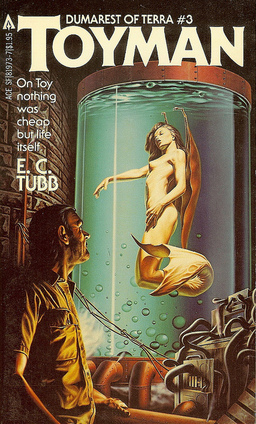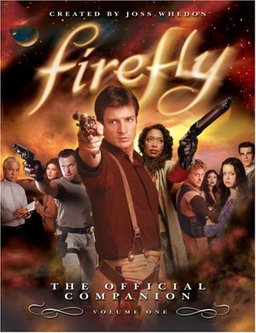What Old Futures Can Teach Us About What SF and SciFi is Really For

So, last week I talked about how old Science Fiction and most media SciFi fails to portray realistic futures. They often do well at predicting specific technical advances, for example speech recognition, but underestimate the way humans will exploit any technology to its limits and use it in conjunction with other technologies.
What’s interesting is that (almost) nobody cares.
For example, I’m reading EC Tubb’s Dumarest books. The technology is wildly inconsistent. Conspirators have devices to block eavesdropping, electronic and human, but use landlines without worrying about phone taps.
Did I mention people use landlines?
In EC Tubb’s imagined future, it’s possible to steal a flyer without somebody tracing it through an ID chip, and without it being spotted on radar or by satellite as you cross the sea. Security means men with guns.
And I don’t care!
That’s not why I’m reading this. The Dumarest books are awesome, like reading the Traveller campaign you wished you’d played in. It’s Robert E Howard (or Harold Lamb) in space with a hero that sits on the spectrum somewhere between Conan and Solomon Kane.
Sure, a lot of Science Fiction makes some attempt at prediction or at least extrapolation. Some writers are interested in the interaction of ideas and technology, e.g. Isaac Asimov, Charles Stross, Arthur C. Clarke. Some are interested in world-building for its own sake, or to lend verisimilitude to an exotic or dramatic setting, for example Jack Campbell and Hannu Rajaniemi.
However, a lot of Science Fiction doesn’t care. Media SF — “SciFi” — quite obviously treats technology as window dressing and a source of plot devices:
La Forge: “Captain, the tech is overteching.”
Picard: “Well, route the auxiliary tech to the tech, Mr. La Forge.”
La Forge: “No, Captain. Captain, I’ve tried to tech the tech, and it won’t work.”
— From Why I hate Star Trek, blog entry by Charles Stross

Books do this too, and not just old ones and media tie-ins, and the odd thing is that a lot of people watch SciFi films and series, play SciFi video games but rarely every pick up a Science Fiction novel.
Why do we so eagerly consume stories about implausible, internally inconsistent SF futures?
Here’s my pet theory:
The differences between kinds of Speculative Fiction are less important than the similarities. All speculative fiction offers the reader escapism, the ability to approach certain issues from a comfortable distance, and an unpredictable setting (something Historical can’t usually do). It also offers the author a flexible sandbox for thought experiments in which the drama is amplified by the setting. The author is free to tune the setting to create specific dilemmas and make these really matter. Tolkien puts the fate of the world in the hands of a “little person”. George Lukas puts the fate of the galaxy in the hands of a farm boy. Meanwhile, both Conan and the USS Enterprise never run out of new or original horizons.
Despite this similarity, specific characters don’t translate well between genres. For example, neither Gandalf nor Conan translate comfortably to a realm of technology contactors and ranged weapons. Honor Harrington is kick-ass, but doesn’t belong in a world of sword-wielding barbarians with close-quarter weapons. Space navies are what make her her.
So, what does SF do well that the other genres don’t do?
“Predict the Future” can’t be the answer, or why would we read EC Tubb for pleasure? The way that media SciFi futures usually look so similar to our present or recent past suggests that the answer is: “SF deals well with modernity”.
I think SF lets us use modern characters in exotic settings without having to create yet another portal scenario (through the wardrobe anybody?), and lets us explore aspects of modernity through literal world building. If we’re in space, then we can also riff around that alienating sense of scale, of “you are here”; how we feel in our own seemingly limitless modern world, writ large. The Dumarest series is like The Fugitive, but magnified a million times.
In other words, I think Science Fiction (and SciFi) is mostly not about the Future. Rather, it tends to be about modern people — like us or people we know — facing up to exaggerated modernity, or its dramatic absence.
M Harold Page (www.mharoldpage.com) is a Scottish-based author and swordsman with several Historical Adventure books in print. His creative writing handbook, Storyteller Tools: Outline from vision to finished novel without losing the magic is available on Amazon.
I would say Sci-Fi is very much about the future. But not the distant future, but the very near one. I think almost all sci-fi that isn’t simply lasers and space ships is social comentary. Looking at the present and considering where we might go from here. It’s either a warning where we might end up if we keep continuing current mistakes, or a proposal what more positive alternatives we might have if we can turn some things around.
All the tech stuff is mostly style, or at best a fictionalized version of something we are already dealing with. To write a relevant story, we don’t need a completely new technology that is completely different from everything we have now. What is needed is a more extreme version of something we already have, but are still not certain about the long term effects on society.
‘The Fugitive’ is a great analogy. Another factor is that Tubb wrote Westerns prior to writing SF. Some of the series’ tropes translate very easily into a Western context – the fellow travellers on a ship has echoes of ‘Stage Coach’, while Dumarest himself is a lot like the Man With No Name, a dusty traveller on the road, reluctantly righting wrongs as he travels from one remote township/planet to the next.
I think maybe there’s a spectrum when it comes to SF. There’s pulp, which only makes a token attempt to forecast the future and is all about recycling familiar tropes. There’s also authors who genuinly do try to extrapolate from contemporary concerns (Gibson and Kim Stanley Robinson come to mind).
I think in pulp style sci-fi and similar works, the future tech and alien worlds exist to give the hero things with which he can interact in ways that can’t normally happen, but are still cool and fun. And I noticed that these stories tend to work with almost no plot changes just as well in a fantasy world. Star Wars being a very good example of going the other way and doing a fantasy story in space.
We tend to call everything with space ships and laser “science fiction” and everything with magic “fantasy”, but that really only looks at the very surface of things. When you look at themes and structures, Star Wars and A Princess of Mars aren’t sci-fi at all. They are not fiction that deals with science.
Not to badmouth them, I actually like that genre a lot more than actual fiction about science.
I love the Dumarest books – I read one a year. It doesn’t matter that each new world usually fells pretty much like the last one. I’m just waiting for the scene in each book where Dumarest has to throw down on somebody (or something) – in an alley, a boxing ring, a Coliseum, a forest…wherever. Tubb wrote the best battles in the business.
In general, it’s a good idea to consider any story in context of the year it was written, rather than the year it was set in. For a different genre example, check out how Westerns depicted lawmen in the 1950s, as opposed to the late 60s and early 70s.
[…] T (The Black Gate) What Old Futures Can Teach Us About What SF and SciFi is Really For — “The Dumarest books are awesome, like reading the Traveller campaign you wished […]
[…] here it is, AD2015. This being the 21st century, I hope you’re enjoying the belated rocket pack Santa finally brought you. (For some reason mine didn’t arrive and I got a sword […]
[…] here it is, AD2015. This being the 21st century, I hope you’re enjoying the belated rocket pack Santa finally brought you. (For some reason mine didn’t arrive and I got a sword […]